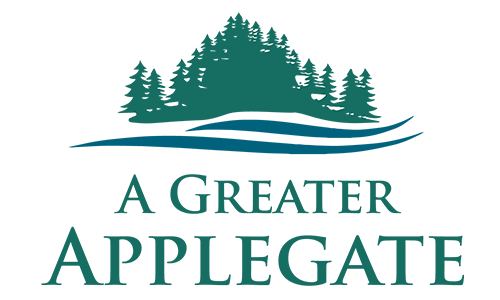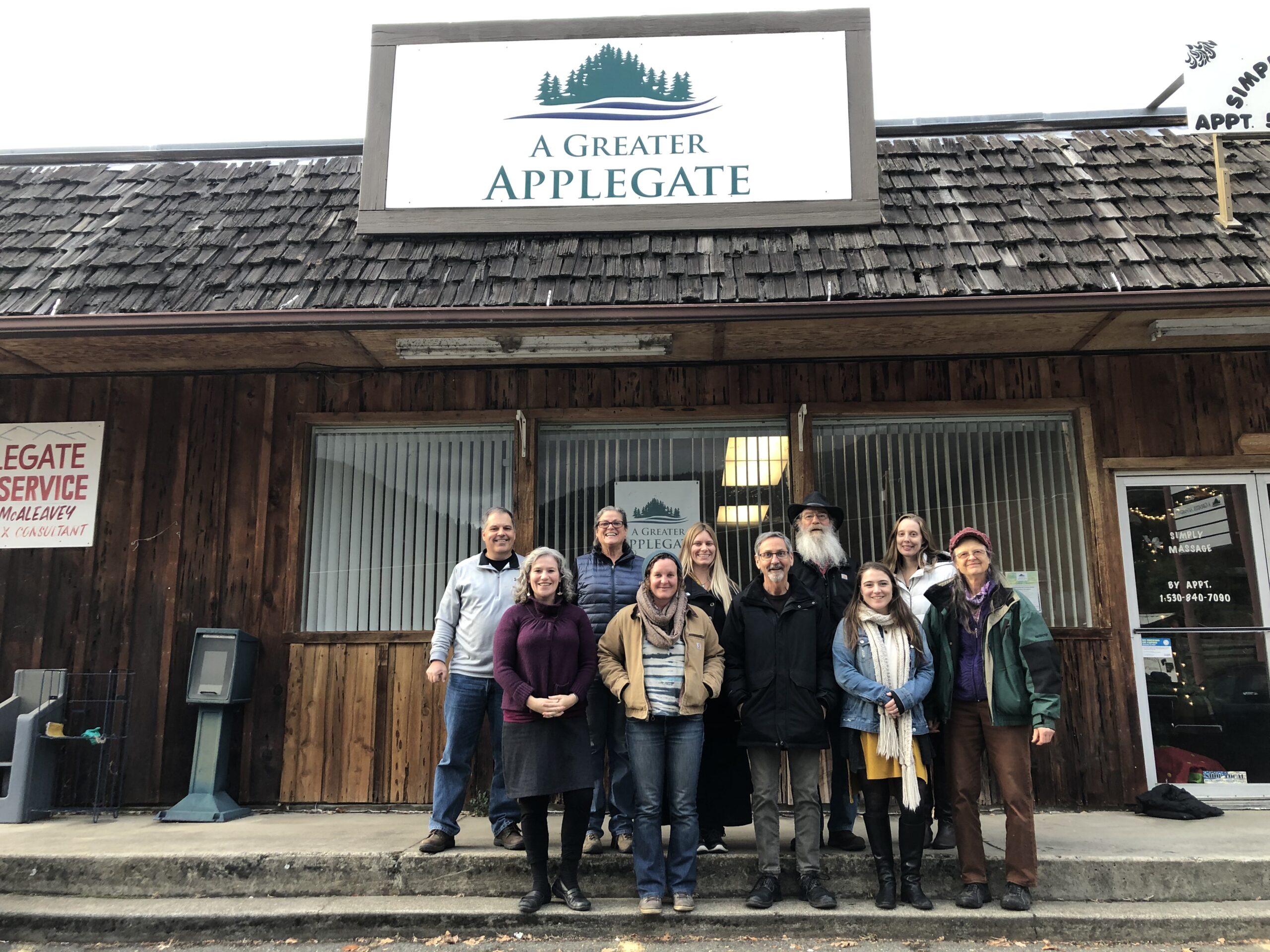Nonprofit AGA is here for you—and also wants to hear from you
By Diana Coogle
If the thought of a Dollar General in the Sunshine Plaza in Ruch makes your toes curl, better listen to Seth Kaplan, executive director of the nonprofit A Greater Applegate (AGA), who says it could happen if, say, a locally owned store folds.
Better buy local, Seth says, to make that less likely.
But maybe you don’t mind if a Dollar General moves in.
Whatever you want to see in the Applegate, A Greater Applegate wants to know.
“I believe AGA is the only organization in the Applegate Valley looking at issues and concerns of the entire valley,” Seth says. “We want to be the organization that convenes community values, visions, and voices and turns them into community action.”
“Our goal is to be working in this place, of this place, and trusted by this place,” adds Megan Fehrman, neighborhood connections coordinator for AGA. “It’s a long-term commitment to the Applegate community that will bring resources here to support a living economy, a strong community, a resilient environment, and a self-determining social system.”
Nice. Big ideals.
How?
To learn what people in the Applegate care about on a very local level, AGA is looking at the Applegate from the perspective of its 11 neighborhoods (as AGA sees them): Little Applegate/Yale Creek, Upper Applegate/McKee Bridge, Humbug Creek, Thompson Creek, North Applegate, Ruch, Provolt, Williams, Griffin Lane/Sterling Creek/Cady Road, Wilderville/Wonder/Murphy, and Elliott Creek/Applegate Lake/Carberry Creek.
Don’t see your residence there? Tell Seth! They want everyone’s input.
To that end, Megan is coordinating neighborhood meetings, at a time and in a place convenient to each neighborhood, inviting opinions from all residents. There’ll be wine and food, and butcher paper for writing down ideas. And lots of listening.
AGA has already held two successful meetings, with 50 people at one and 35 at the other, where issues like traffic, a community center, trails, environmental concerns, art, and social events came up.
Once AGA has an idea of the vision of the neighborhoods (and the Applegate as a whole), they want to help make those things happen. For instance, they can provide financial assistance in the form of Momentum Grants.
How do they think they’re going to get people to meetings?
“We’ll put up signs,” Seth says enthusiastically. “We’ll invite people. We’ll put notices on Jo’s List and Applegate Valley Connect and AGA websites. We’ll let people know through the Applegater.”
But what if a person just doesn’t go to meetings? What if someone lives too far up the road or thinks his or her input isn’t important anyway? Stop! AGA thinks your input is essential. If you don’t like meetings, you can fill out AGA’s planned upcoming survey.
“I find our goals very compelling,” Megan says, “and worth putting some energy into to see what we can do.”
A Greater Applegate isn’t thrashing in the dark. The Ford Family Foundation’s Rural Development Initiative, which has supported AGA with generous grants, funds eight to twelve such organizations in Oregon. One of the best models is Illinois Valley’s Community Development Organization, called IVCanDO.
But AGA is unique in that it is the only one of those organizations without a city center. In the words of an anonymous participant at a neighborhood meeting, “We’re centrally isolated. Our center is ourselves.”
It’s impossible not to get as excited by AGA’s vision as Seth and Megan and AGA’s outreach coordinator, Ryan Pernell. Consider the past successes: Applegate Valley Connect, a website (applegateconnect.org) with a local events calendar and a directory of Applegate businesses; a network of nonprofits; and a business network that is working on a map of businesses in the valley, a branding logo for the Applegate, and “Welcome to the Applegate” signs on Highway 238.
“We want the businesses here to be successful,” Seth says.
Don’t we all! With all our differing viewpoints, there is something about living in the Applegate that makes us “see each other as cousins,” as Seth says. The Applegate isn’t Jacksonville. It’s not Medford. It’s not Grants Pass. It’s us, and AGA is out to find out what we want. Don’t miss the opportunity to paint yourself into the picture.
Diana Coogle
This article appeared in the Spring 2020 Applegater (applegater.org). Used by permission.


I am sure this post has touched all the internet visitors, its really really nice paragraph on building up new blog. Felix Youngkin
Way cool! Some extremely valid points! I appreciate you penning this write-up and the rest of the site is extremely good. Robby Hosford
Very neat article post. Much thanks again. Keep writing. Robin Celis
Hello. This article was extremely fascinating, especially because I was looking for thoughts on this subject last Tuesday. Shannon Vilar